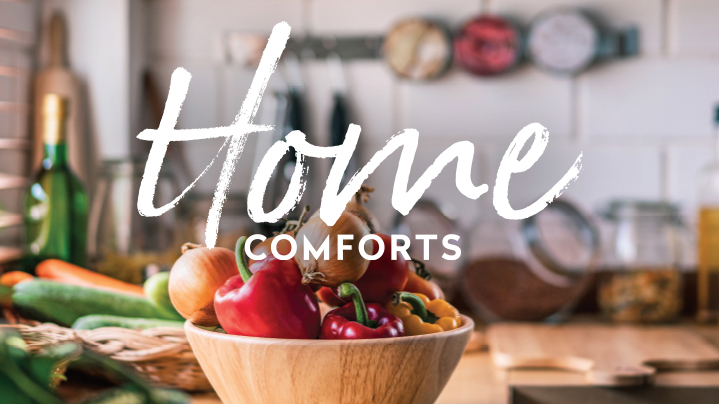Home comforts
Over the last decade, more Kiwis have discovered the benefits of a sustainable lifestyle. Now, with inflation pushing up the price of food and groceries, Kiwis are increasingly exploring how their properties can work double duty as a private supermarket.
Informed by the experience of a global pandemic, Kiwis continue looking to lifestyle properties for a slice of self-sustaining property that looks increasingly more attractive given rising inflationary pressures.
As the catalyst for rising costs associated with food, fuel and essential housing, the Consumer Price Index (CPI) reached a three-decade high recently, noting annual inflation at 5.9 percent.
For Kiwis with that innate number eight wire mentality, the answer to this is simple - grow your own to avoid the pain of rising prices at the supermarket checkout.
FRUIT, VEGETABLES & HERBS
As a strong food-producing country, New Zealand’s horticultural industry has remained resilient through recent disruptions and the sector has reported record export value growth as consumers around the world enjoy Kiwi-grown produce in growing numbers.
New Zealand’s horticultural industry has remained resilient through recent disruptions and the sector has reported record export value growth with trickle-down effects for lifestyle property owners.
This has trickled down to the hobby-farming sector which has seen an increasing number of lifestyle property owners undertake productive gardens of their own.
The experts advise planting with the seasons to ensure maximum sustainable output, with May serving as an excellent time to plant beetroot, broccoli, onion, radish, rhubarb, silverbeet and thyme.
While a focus on healthy, nutrient-rich food is the aim of the game, key considerations for gardeners should include your climate, soil type and growing conditions which will likely dictate what is best suited to your patch.
And while it may sound obvious, it’s worth noting that those investigating their opportunities are best to conduct thorough research as orchards can be fickle and may require specialised skill sets.
Bayleys advises seeking the right advice from experts if necessary.
CHICKEN & EGGS
Protein-rich and quite intelligent, keeping chickens on your lifestyle block yield some excellent dividends by way of fresh eggs and impressive waste disposal for food scraps.
Creating strong infrastructure for your chooks should be a number one priority, including a coop with dark nesting boxes, perches for roosting and shelter from the sun, rain and draughts.
A fenced area to serve as a chicken ‘run’ is also required to provide a place where they can roam, forage and bathe in the dust.
Regulations around keeping poultry across New Zealand vary between regions so it pays to check these out online in the planning phase.
When it comes time to choose the brood, consider your purpose for keeping the chickens, this will determine the age and breed you seek.
As an alternative to buying from a breeder, the New Zealand Hen Welfare group and Animal Sanctuary both rescue hens and rehabilitate them for adoption, though they may require a bit more care and attention as they adjust to life beyond captivity.
HONEY
Property owners are increasingly looking to unlock the potential of apiculture – or the keeping of bees - to enhance pollination on their lifestyle blocks and yield goodies including beeswax for household items, cosmetics and honey.
However, there are important considerations for those exploring beekeeping as their new hobby.
As with any endeavour, there will be start-up costs for equipment and tools including hive-ware, smokers, protective equipment; beekeeping suit, gloves, a hood/veil and packing containers.
Extracting honey means you are handling food which requires a high level of attention to hygiene practices. Apiculturists intending on selling honey will need to meet requirements under the Food Act 2014 which covers safe handling, storage and packaging of food products across New Zealand.
Bartering, swapping or giving your honey away to family, neighbours and friends is exempt from these rules.
CLEANING PRODUCTS
Cleaning products needn’t be an expensive supermarket purchase, and a few simple recipes with stock-standard ingredients could see you make the switch to all-natural cleaning in no time.
While warm water and vinegar can be used for most cleaning jobs, two of the most effective natural recipes from best-selling author Eleanor Ozich add a special element to these homemade concoctions:
Laundry powder
• 1x bar of natural soap, grated
• ¾ cup of borax or washing soda
• ½ cup of baking soda
• 10x drops of lavender essential oil
• 10x drops of eucalyptus essential oil
Place each of the ingredients into a food processor and blitz to a fine powder. Use two or three tablespoons for each load of washing and ensure you clean the food processor bowl well, rinsing with a splash of vinegar before using again for food.
All-purpose cleaning spray
• 2x teaspoon of Dr Bronner’s Pure-Castile liquid soap
• 10x drops of wild orange essential oil
• 10x drops of lemon essential oil
• 10x drops of peppermint essential oil
Place each ingredient in a 500ml spray bottle and top up with filtered water. Shake gently to combine and you’re ready to go.
Read more...
[Download PDF]Subscribe to receive the latest residential news and insights from Bayleys’ View magazine.
